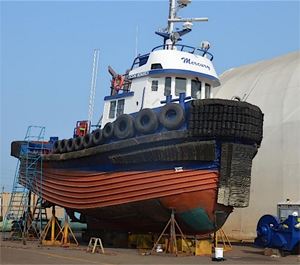The mate on watch aboard the Canadian tugboat Ocean Monarch was likely suffering “acute fatigue” when he fell asleep at the wheel and the vessel grounded in British Columbia’s narrow Princess Royal Channel, the Transportation Safety Board of Canada (TSB) has determined.
The 47-foot Ocean Monarch was towing the cement barge Evco No. 15 from the Fraser River to Kitimat, British Columbia, when the incident occurred at about 0436 on July 9, 2017. Working on a 24-hour schedule, the mate and master had been alternating navigational duties since departing the Fraser River at 0200 on July 7. At the time of the grounding, the mate was alone at the wheel and had been on duty for at least eight hours. The master and deck hand were asleep below deck, so the mate had no human interaction to help him remain awake. At the time, the tug’s course was being controlled by the autopilot, and navigational alarms on two chartplotters were disabled.
“It is likely that the acute fatigue, chronic sleep disruptions, circadian rhythm desynchronization and nighttime working risk factors experienced by the mate in the days preceding the occurrence, combined with the low and monotonous workload in the wheelhouse, resulted in the mate falling asleep sometime between 0336 and 0436,” the TSB wrote in its report.
No pollution or injuries were reported. The tug’s hull and starboard propeller nozzle were damaged. After assessing the damage, the master resumed the voyage to Kitimat at 0453 using the port engine, and at 1558 on July 9 the tug and barge arrived at their destination.
The TSB cited similar concerns about solitary watchkeeper fatigue in its investigation last year into the October 2016 grounding of the U.S. tug Nathan E. Stewart in Seaforth Channel. The breached vessel spilled about 29,000 gallons of diesel into the environment.
The TSB noted in its report on Ocean Monarch that although the tug’s actual gross tonnage was 63.6, it was registered as a tug of not more than 15 gross tons and therefore was not subject to regulatory oversight such as periodic inspections, possession of a safe manning document or limitations on the type of voyages that it could undertake.
“If tugs of more than 15 gross tonnage are registered as tugs of not more than 15 gross tonnage, they will not be subject to oversight intended to ensure that they operate safely, and there is a risk that deficiencies will go unidentified and/or unaddressed, leading to accidents,” the report stated.
The TSB also found that there were no strategies in place to mitigate crew fatigue. “Given the tug’s 24 hours per day, seven days per week operations, a crew complement of three made it challenging and, at times, impossible to have two watchkeepers at night while also ensuring the crew was sufficiently rested,” the agency said.
The report later added, “If companies do not establish a strong safety culture, there is a risk that commercial pressures and operational considerations will erode safety, leading to a hazardous operating environment for the crew.”
Following the incident, Ocean Monarch’s owner, Mercury Launch & Tug Ltd. of Vancouver, British Columbia, installed a bridge navigational watch alarm system on the tug. New operating procedures also were developed and implemented on the vessel, and the company informed all of its masters that navigational watch alarms are to be enabled and monitored at all times.

